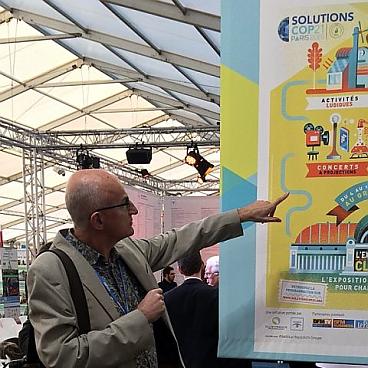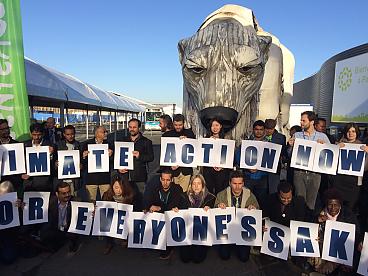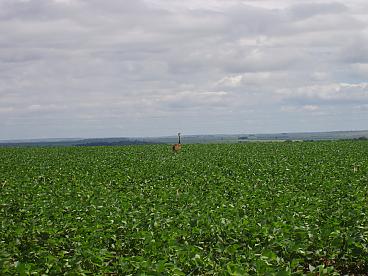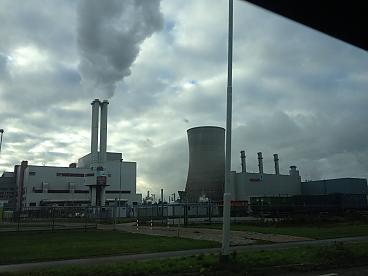Smaling at the climate summit: The agreement in Paris
Smaling at the climate summit: The agreement in Paris

SP Member of Parliament Eric Smaling is attending the climate summit in Paris. The aim of the conference is to reach a new agreement on the climate. This has to be in place in 2020, when the current treaty, the Kyoto Protocol, expires. Smaling will be sending a daily report of his experiences to the SP site.
Day 1: The day after tomorrow
‘The day after tomorrow’, it was called. To a far greater extent than Al Gore’s movie full of graphics and tables, ‘An inconvenient truth’, this film has stayed with me. It sketches out the consequences of the ultimate climate change: the curtailing of the Atlantic Ocean’s warm Gulf Stream. In the wink of an eye, the Northern Hemisphere becomes icy cold and unliveable. New York’s under water and this time the people up in the skyscrapers are lucky. They live above the water, which is now ice. In the end survivors seek asylum in Mexico – and receive it! The film concerns our foolishness, but it’s stayed with me as an example of how we can master small, gradual changes, but at the same time we don’t know what a catastrophic point is approaching. And that’s why tens of thousands of people descended on the old Le Bourget airport north of Paris.
The massive size of the gathering immediately wore me out, so as soon as I arrived I fled to the African pavilion. And there right away it was interesting: the Saharan and Sahel countries want to get on with solar energy; in Ethiopia a new water-power centre is being built in the Nile, paid for by Ethiopians overseas in what’s known as a ‘diaspora fund’; and, as a result of the importance of tropical rainforests, Congo takes centre stage.
What we have heard from Secretary of State for the Environment Sharon Dijksma is that she’s reasonably optimistic that an agreement will be reached. On day 2 I’ll be looking for that agreement, as well as for our Euro-MP, Anne-Marie Mineur.

Day 2: an imaginary wall
The ‘agreement’ is packed full of clauses in brackets and lists of choices, but the French chairperson has succeeded in getting the number of pages down to around thirty. That’s pretty good, because as everyone has something they want to bleat about, an agreement of this kind is of course a chain of exceptions and get-out clauses. It’s a pain in the neck to try to reach agreement on expensive measures on things which here and there are beginning to make themselves known (low-lying islands sinking with increasing frequency, the Bangladesh delta becoming uninhabitable), but which in the coming decades will be more widely felt. And even that has something of the crystal ball about it. Today ends primarily with the business world. Feike Sijbesma, boss of global corporation DSM, gives his view and is extremely clear: our children and grandchildren will have to contend with unacceptable consequences of inaction, so we have to act now. He is referring to the extent of the uproar over ‘a mere’ sixty million refugees.
Meanwhile our MEP Anne-Marie Mineur is out amongst the activists. Environmentalist organisations are concerned about the polluting industry lobby and, for example, the exceptional position of air transport and shipping. The field is so big that we have to keep each other informed as to what’s going on. And for her, the equivalent of Dijksma is a European Commissioner who we are obliged to wait and see whether he will even turn up.
The entire night sees a meeting in an enormous hall in which everyone sits behind a plaque carrying the name of their country. Today it will become clearer whether we have an agreement, or whether there are imaginary walls remaining between, in particular, the industrialised countries of the west on one side and the emerging markets and developing countries on the other.

All day we’ve been emitting CO2 and other green house gases. The reason is that in almost everything we do we’re making use of fossil fuels containing carbon. On the one hand directly, in driving our cars, or setting the thermostat on our heating system higher. On the other hand indirectly, in eating meat for the production of which forests are cleared to grow soya to feed our pigs, and by buying toys, coffee makers, mobile phones and kitchens for which an industrial process is needed to produce them. Prosperity and greenhouse gases go together like eggs and bacon. One of the best books in Dutch of tips about what you can do about this is called 'Het kan als je het wilt' (It can happen if you want it to).
While the ministers slog away to reach an agreement, Anne-Marie Mineur and I visit as many of the fringe meetings as possible. Indonesia devoted an afternoon to tropical rain forests. Brazil and Congo were also represented. What’s striking is that on the one hand you have the forest protectors who want the best for the local population, the orangutans and biodiversity, but on the other are the hard business interests around tropical wood, soya and palm oil. They swear that cooperation is going well, but the reality is that Indonesia and its neighbours Singapore and Malaysia have been for months shrouded under a blanket of smoke, and that using fire to clear the forest to make way for them to be replaced by palm oil plantations is extremely lucrative, in the short term at least. All we can do is work with these countries on maintaining their tropical rain forests. Especially as we’re their export markets.

Day 4: From fossil fuels to a sustainable economy
High fives, pats on the shoulder, hugs, tears! Whether you like it or not, you can’t deny it was exceptional. Did the world need this? It seemed so. And that’s perhaps the gain from this climate summit, that 195 countries could come to an agreement on something. That evidently they succeeded in keeping each other’s history, desires and sensitivities in mind, without this leading to a weak agreement. France deserves a major compliment.
Do the agreements go far enough? Well, things can always be better. Aviation and shipping are excluded. That’s a pity. The force of the agreement lies in the fact that all countries and sectors are on board, which pulls the rug from under the argument of the uncooperative section of corporate business that measures taken by one and not the others would undermine a level playing field and damage competitiveness, leading to their going elsewhere. For many island states, the agreements certainly don’t go far enough. On Kiribati everyone is regularly up to his or her ankles – or higher - in sea water. The situation of these states has undoubtedly helped to bring about an agreement fixing a maximum temperature rise. $100 billion a year has been committed to help poor countries from 2020 to deal with the consequences of climate change. The sum is something of a shot in the dark, and it’s a pity that it applies only from 2020. What would be ideal would be if goods and services were subject to a CO2 tax, a sort of climate-VAT. That’s still a bridge too far. For the time being we have to make do with the emissions trading system, which doesn’t work very well at all.
It’s a huge challenge. We are after all heading towards a population of nine billion and the average prosperity in the world is on the rise. And prosperity means emissions, at least it did until 12th December. The transformation from fossil fuels to sustainable energy is an exciting process, and increasingly the lights are on green. Banks and pension funds are turning away from fossil fuels, energy corporations are dividing their activities between fossil fuels and sustainable sources of energy. That could be hard. For the Netherlands it will be a particularly tough task. Cheap gas has made our country an energy-intensive land, with many ‘high temperature’ industries, ports established for the supply and processing of fossil fuels and a gas-dependent greenhouse-based horticulture sector. We profile ourselves as a ‘distribution’-land with associated road network and transport sector; we have a bit of wind power and a bit of solar, no water power of any significance and a lot of people per square kilometre. Think about it.
Things must nevertheless change. An important starting point is that we must forget the idea that we that we need increased prosperity, an important argument behind the TTIP, for example. We have to aim at two things: an improved division of existing wealth, and paying more attention to the origin of this prosperity. Finally a matter of which you hear little, but which must and shall gain more of our attention: how will we move employment from a fossil-fuel to a sustainable economy? On that, in my view, we will in the months to come be engaged in extensive discussion.
- See also:
- World
